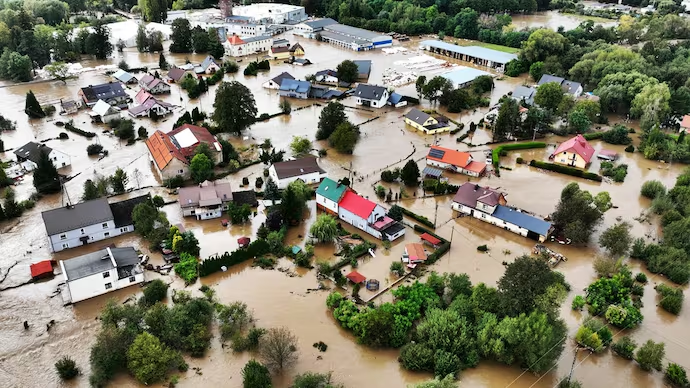The effects of climate change are becoming increasingly evident across the globe, and Europe is among the regions facing the harshest wrath. A new report by the European Union’s Copernicus Climate Change Service and the World Meteorological Organization (WMO) reveals that the continent experienced its most widespread flooding since 2013, with over 30% of Europe’s river systems impacted in 2024 alone.
The report highlights that climate extremes, ranging from prolonged heatwaves and shrinking glaciers to floods and droughts, are becoming more frequent and severe. More than 335 people lost their lives in flood-related disasters, and over 410,000 individuals were affected. The financial toll from storms and floods is estimated to exceed ₹1.62 lakh crore.
WMO Secretary-General Celeste Saulo stressed the urgency of addressing rising global temperatures, stating, “Every additional fraction of a degree of temperature rise matters because it accentuates the risks to our lives, to economies, and the planet.”
Southern Europe endured its longest-ever heatwave, lasting 13 consecutive days, while Scandinavian glaciers recorded their fastest melting rates. Eastern Europe, on the other hand, grappled with persistent drought conditions due to below-average rainfall. The situation was no better for cities near major rivers, where nearly one-third of river systems surpassed high flood thresholds, and 12% reached severe flood levels.
One of the most devastating events occurred in Valencia, Spain, where flooding in October 2024 claimed 232 lives. A month prior, Storm Boris delivered torrential rainfall across Austria, Germany, Slovakia, and the Czech Republic.
Despite the challenges, Europe made strides in clean energy, with renewable sources contributing 45% of the region’s electricity in 2024. Additionally, most European cities have established frameworks to improve climate resilience.
The report also emphasizes that beyond climate change, factors such as river management and urban development significantly influence flood risks. Experts urge a globally coordinated response, improved infrastructure planning, and strict adherence to international climate agreements to mitigate future climate-related disasters.
As the climate crisis intensifies, the need for urgent, collective action to protect communities, ecosystems, and economies has never been clearer.






